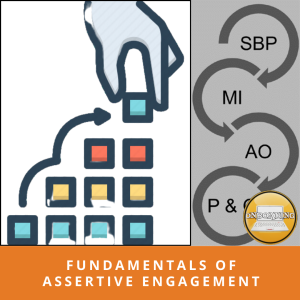Fundamentals of Assertive Engagement: Onboarding NEW

Available Summer ’24
Logistics
Type: Self-Paced / Onboarding
Time to Complete: 90 minutes
Target Audience: This module is appropriate for all practitioners including case managers, outreach workers, medical professionals, social workers, addiction supports, and more who support complex individuals, particularly those experiencing homelessness. Also, all those in system or program leadership roles should be familiar with this practice to support staff in incorporating it into their day-to-day practice.
Components
- Videos
- Text
- Exercises
- Knowledge Checks
- Final Assessment
- Course Evaluation
- Completion Certificate
Description
The level of engagement and motivation to receive services can vary across individuals, with reasons for poor engagement ranging from being something inherent to their illness (e.g., lack of insight) to a rational reaction to a service system that has been experienced negatively. Assertive Engagement (AE) draws from various theories, approaches, and lenses such as Strength-Based Approaches, Trauma-Informed Care, Motivational Interviewing (MI), Empathy, Ambivalence, Unconditional-Positive Regard, in addition to many other components. It aims to support and complement frameworks centered on racial equity, anti-oppression, and trauma-informed care and is an essential skill and best practice for all who provide support and are in contact with complex individuals, including people experiencing homelessness.
This module outlines the the core elements of AE providing learners with a basic understanding and knowledge base to have a greater, more positive impact while giving those they work with or support the best opportunity to make change in their own way and time frame. We will provide a high-level look at what are called the “Three Sets of AE.” They are:
- Mind Set: How we think about the people we work with.
- Skill Set: How we do the work.
- Heart Set: How we feel about and treat the people we work with.
This module is a primer to give new and existing staff a basic understanding and head start, preparing them for the next step of participating in a full 2-3 day live training where these components are explored in more detail. The full training also contains a full basic level of Motivational Interviewing training which is practical and experiential (See “Supporting People Through Change: Assertive Engagement” in the live training section of this site). Also learn about the TTA version of MI which we call MI On the Fly which is developed specifically for people who have small windows of opportunity and time to connect with their participants.
Learning Objectives
- Define Assertive Engagement (AE)
- Understand the “Three Sets” of AE and describe what elements are contained within each.
- Define Strength-Based Practice, Empathy, Unconditional Positive Regard, Motivational Interviewing, Trauma-Informed Care/Pactice, and Assertive Outreach.
- Understand how each element plays a role in supporting individuals and why.
- Create a plan for to incorporate these elements into practice even before receiving the full live training.
- Learn the importance of removing the “expert hat” when supporting people and allowing self-determination and participant control regarding recovery/change.
